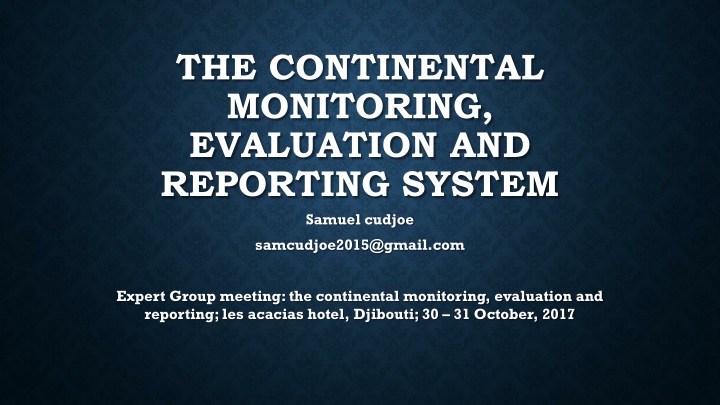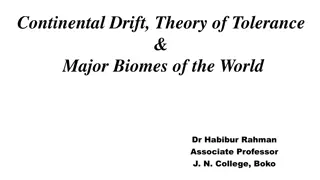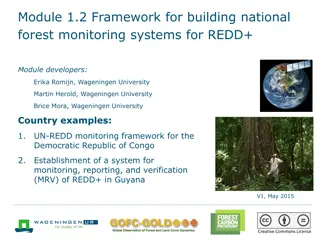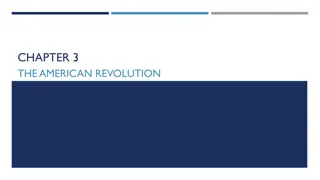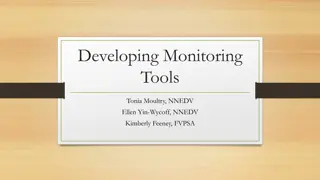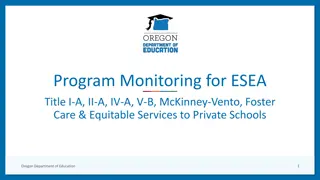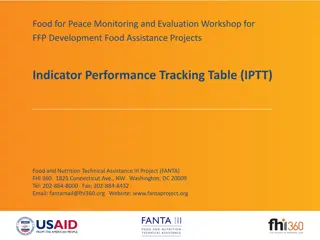Effective Strategies for Communication and Reporting in Continental Monitoring & Evaluation
Strategies for effective communication and reporting in the Continental Monitoring, Evaluation, and Reporting System are outlined, emphasizing the importance of engaging stakeholders at both country and continental levels. Initiatives include generating public awareness, outreach efforts, and leveraging various communication channels for disseminating information. The focus is on promoting governance, transparency, and stakeholder involvement in the implementation process.
Download Presentation

Please find below an Image/Link to download the presentation.
The content on the website is provided AS IS for your information and personal use only. It may not be sold, licensed, or shared on other websites without obtaining consent from the author.If you encounter any issues during the download, it is possible that the publisher has removed the file from their server.
You are allowed to download the files provided on this website for personal or commercial use, subject to the condition that they are used lawfully. All files are the property of their respective owners.
The content on the website is provided AS IS for your information and personal use only. It may not be sold, licensed, or shared on other websites without obtaining consent from the author.
E N D
Presentation Transcript
THE CONTINENTAL MONITORING, EVALUATION AND REPORTING SYSTEM Samuel cudjoe samcudjoe2015@gmail.com Expert Group meeting: the continental monitoring, evaluation and reporting; les acacias hotel, Djibouti; 30 31 October, 2017
MER COMMUNICATION, REPORTING AND SYSTEM AUTOMATION
MER COMMUNICATION To galvanise the populace into action in monitoring the implementation of the NPoA it is imperative that they be regularly informed about the processes and outcomes. To do this both the NGCs and continental Secretariat need to develop robust communication and reporting strategies. Need to use existing national communication systems
MER COMMUNICATION Country-level communication NGCs should ensure that data collected (CSAR phase, CRR phase and progress reporting phase) is not just collected for reporting purposes to the APR Secretariat, but should determine how the information can be used to promote governance in-country. Each NGC should develop a Communication Strategy clearly outlining how the country would share APRM-related information with key in- country stakeholders.
MER COMMUNICATION Country level communication strategies should Generate sustained public awareness, involvement, support and ownership by stakeholders on the APRM and its execution; Ensure extensive outreach with up to date and accurate information. It will target Parliament public institutions, (Ministries, Departments and Agencies), CSOs at both the sub-national and national levels; Include activities such as consultation meetings, promotion of debates, discussions, workshops, community forums, songs, poems, plays, teaching in school, certification of being APRM compliant, APRM clubs, volunteers, and Incorporate radio and television programmes, Internet and social groups, memorabilia and paraphernalia, and sport events; and Include the publication of newsletters; and preparation of promotional items such as CDs, DVDs, caps, pens, t-shirts, key holders, bags, bracelets, diaries, gold plated pins,
MER COMMUNICATION Continental-level Communication at the continental level shall be guided by the APR Secretariat s communication strategy which should aim at galvanising large segments of the people on the continent and the diaspora into action. The Strategy should clearly indicate how information and reports derived from the e-system would be packaged and disseminated to stakeholders.
MER COMMUNICATION The continental communication strategy should: Generate sustained public awareness, involvement, support and ownership by the African population of the APRM and its execution; Ensure extensive outreach with up to date and accurate information. It will target AU Member States, staff, organs and agencies; RECs; African citizens both within the continent and in the diaspora and their institutions, including private sector, civil society etc.; as well as APRM s partners. Be executed by the AU Organs and Agencies (including NEPAD, AGA and APSA), RECs, Member States, strategic partners (UNDP, AfDB and UNECA) and partners; Include activities such as consultation meetings, promotion of debates, discussions, workshops, community forums, songs, poems, plays, teaching in school, certification of being APRM compliant, APRM clubs, volunteers;
REPORTING SCHEDULE Country-level reporting The NGCs would determine in-country reporting schedules following consultations with key stakeholders. In any case, feedback from the reporting regimes should be received ahead of time to enable the NGC submit the annual progress reports to the APR Secretariat at least 2 months before an APR Forum. National validation workshops
REPORTING SCHEDULE Continental-level reporting The e-system is designed to receive continuous information from APRM participating countries, and to this end the Knowledge Management and M&E Division will produce progress reports on demand. The following APRM reporting schedule is proposed. Semi-annual reports: The reports shall be analytical, summarising the status of the achievements of implementation of the National Programmes of Action and the state of governance on the continent. Annual reports: These are comprehensive annual evaluation reports, giving a detailed assessment of performance. The reports also highlight common issues occurring across all implementing countries, highlighting issues of sustainability of strategies and processes.
SYSTEM AUTOMATION MER automation is to develop a simple, technology enabled monitoring approach that supports APRM managers, staff and partners at various levels to capture, analyse, visualize and report on progress in delivering work and achieving results. It involves: developing and implementing a practical monitoring approach that meets the needs of APRM, AGA and APSA and their stakeholders; building the capacity of APRM, AGA and APSA staff and key partners (NGCs) to populate and use the approach; and creating clear data visualization and reporting tools to communicate monitoring results to multiple audiences for effective management and decision-making.
MER ROLES AND RESPONSIBILITIES Country level The Focal Point Receives the Country Self-Assessment Report and progress reports and submits same to the APR Secretariat Briefs the President or Head of State on progress of implementation of the NPoA The National Governing Council/Commission The National Governing Councils/Commissions shall be responsible for the overall coordination of MER activities at the country level.
MER ROLES AND RESPONSIBILITIES The Technical Review Institutions/CSO Ensuring that all the key indicators outlined in the base questionnaire are captured in the survey instruments. Collect administrative data and information from key institutions such as the Ministry of Finance, Development Planning Ministries/Departments/Commissions, Statistical Services/Bureaus, in the preparation of the CSAR; Adopt a participatory approach in collecting data from a wide spectrum of stakeholders National Development Planning Ministries/Commissions/Departments Assist the NGC to redefine indicators in the National Programmes of Action to facilitate their mapping onto the national development plans Support the NGC in the development of the National Programme of Action (setting of targets, budgeting etc) Support the NGC to map the NPoA onto the National Development Plan Support the NGC by providing data on indicators mapped onto the national development plans
MER ROLES AND RESPONSIBILITIES Statistical Department/Unit Support the NGC and TRIs to develop survey instruments to be used to collect data using the APRM base questionnaires Support the NGC in the definition of indicators, methods of collection and analysis of data Provide the NGCs with data and information needed to produce progress reports
MER ROLES AND RESPONSIBILITIES Continental level The M&E unit shall be responsible for the design, development, implementation and management of a practical APRM-wide performance monitoring and evaluation system and approach. Accordingly, the unit is responsible for: Developing a simple, technology-enabled approach that supports stakeholders at multiple levels to capture, analyse, visualize and report on baselines and progress in delivering work and achieving results; Building the capacity of APRM Secretariat staff and other stakeholders (particularly NGCs) to populate and use the monitoring approach; Creating clear data visualization and reporting tools to communicate monitoring results to multiple audience for effective management and decision-making; Managing a regular cycle of output and outcome monitoring and evaluation, producing evaluative knowledge products, and providing coaching and capacity building in M&E to APRM staff and selected partners; Commissioning and supervising case studies, success stories and impact assessment studies;
MER ROLES AND RESPONSIBILITIES AGA, NEPAD, APSA (CSOs) Share monitoring frameworks with the APRM Secretariat Agree on common core monitoring indicators Share monitoring and evaluation reports Provide technical support where need be Participate in reflective meetings ECA, UNDP, AfDB Provide technical and financial support to build capacities of the APRM Secretariat and the NGCs Provide technical and financial support in developing MER tools and systems Provide support in collecting data from non-APRM countries Participate in reflective meetings
MER ROLES AND RESPONSIBILITIES RECs Provide technical support to build capacities of the NGCs Provide support in collecting data from non-APRM countries Participate in reflective meetings
FUNDING Funding for MER Country level: M&E costs are variable and largely depend on the structure the M&E plan. A good rule of the thumb is to budget at least 5 percent of total NPoA budget for MER. Some items to consider in budgeting for MER include: Staffing: - Salary and benefits, housing/per diem, R&R, etc. for M&E officer; Data collection and entry people (full, part time, or temporary Assessments and/or baselines: For all staff (APRM and partner; including drivers) involved in assessment, Transportation, per diem, lodging Field monitoring: For monitoring trips beyond what is already planned by field agents (including M&E officer accompanying field agents on already planned trips), including drivers, Transportation, per diem, lodging
FUNDING External Evaluations and reviews: Consulting fees or salary Travel (to the country and for the field visits), Per diem Lodging Cost of evaluation Per diem, travel, lodging of project staff involved in data collection (including drivers) Meeting costs of one day management workshop at the end of the evaluation (office supplies, lunch) Reflection events: Per diem, travel, lodging of any staff who have to travel a long distance to the location of the event (e.g., main office staff to field office, field staff to main office) Meals during event Office supplies Meeting room rental Publications
THE CAPACITY NEEDS OF MER UNITS Country-level At the country-level each NGC must determine where to locate its MER Unit. In some countries the NGC has secretariats with MER Units, in others the MER units of the Planning Commission serves this purpose. Continental level The continental level Secretariat has designated the Knowledge Management and M&E Division as the coordinating unit for MER
THE CAPACITY NEEDS OF MER UNITS Human Resource Needs Strategically located individuals who are motivated, committed, competent and interested in MER The human resource needs of the MER Units at both levels should be guided by the information needs outlined in NPoA, the following capacities may be required for an MER unit: M&E plan design Data collection methods (quantitative & qualitative) Data management skills Data analysis skills Data reporting Project monitoring
